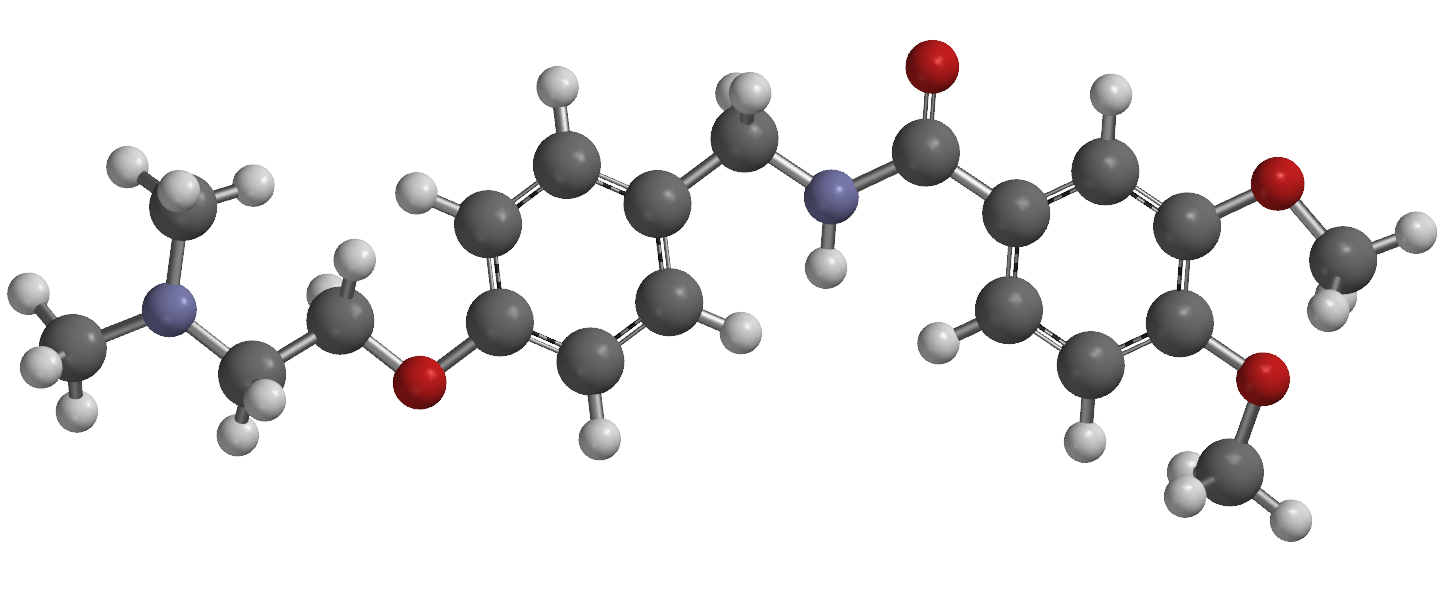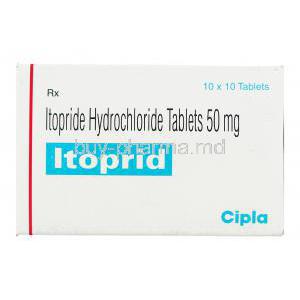Itopride
I. Introduction
a. Definition of Itopride
Itopride is a type of medication that acts as a prokinetic agent. It falls into the category of drugs called dopamine D2 antagonists and acetylcholinesterase inhibitors. Its primary purpose is to improve the movement of the stomach, making it an essential tool in treating gastrointestinal conditions.
b. Historical Background
Itopride originated in the 20th century, as it was invented in 1986. When Itopride was first introduced to the field, it marked a significant advancement in managing gastrointestinal issues, particularly gastric motility-related. The development of Itopride involved combining existing knowledge about agents with innovative pharmacological techniques. As a result, this compound was strategically launched worldwide as a treatment for specific gastric disorders.
c. Importance in Medical Treatment
The significance of Itopride in treatment cannot be underestimated. It is widely used in areas such as improving gastric motility for patients with chronic gastritis and dyspepsia, managing gastrointestinal symptoms like bloating, discomfort, and nausea, and serving as an additional treatment option for specific gastrointestinal surgeries. These diverse applications have made Itopride an invaluable tool in gastroenterology, offering relief to patients and improving the overall quality of care.
d. Scope of the Article
This article seeks to provide an understanding of Itopride, exploring its approved and experimental medicinal applications, its distinctive pharmacological features, and its significant impact on medical treatments. The information covered will encompass aspects such as indications, dosage recommendations, possible side effects, and special considerations for administration. The intention is to serve as a resource for healthcare professionals and researchers.
II. Uses of Itopride
a. Approved Indications
i. Gastroprokinetic Agent
Itopride is widely recognized for its effectiveness in treating disorders. It blocks dopamine receptors and inhibits acetylcholinesterase, leading to enhanced movement in the system. This helps alleviate issues like constipation and bloating by promoting the smooth passage of food through the digestive tract.
References:
- Itopride - Wikipedia1
- Itopride: Uses, Interactions, Mechanism of Action | DrugBank Online2
- Itopride 50mg Tablets - Rosheta Saudi Arabia3
- Itopride: Indication, Dosage, Side Effect, Precaution - MIMS4
ii. Treatment of Dyspepsia
In the field of treating dyspepsia, Itopride shines as a therapeutic option. It helps speed up the emptying of the stomach and improves muscle activity in the tract providing relief from uncomfortable symptoms like pain feeling full, and nausea. Its specific mechanism makes it a preferred choice among healthcare professionals.
References:
- Itopride - Wikipedia1
- The efficacy and safety of itopride in feeding intolerance of critically ill patients2
- Itopride: Uses, Interactions, Mechanism of Action | DrugBank Online3
- Management of functional dyspepsia: state of the art and emerging therapies4
b. Off-Label Uses
i. Management of Nausea and Vomiting
Beyond the approved uses, Itopride can also be used to help manage nausea and vomiting. Whether these symptoms arise from chemotherapy, surgery, or other underlying health issues, Itopride offers an option for controlling these symptoms. It achieves this by targeting brain pathways responsible for transmitting signals related to nausea and vomiting, ultimately reducing these sensations.
References:
- Expert Consensus on Effective Management of Chemotherapy-Induced Nausea and Vomiting1
- Chemotherapy nausea and vomiting: Prevention is best defense2
- Nausea and Vomiting Related to Cancer Treatment - NCI3
ii. Other Experimental Applications
Itopride goes beyond its use and is being studied for various experimental applications in ongoing clinical trials. These include its potential as a treatment for diabetic gastroparesis, its ability to alleviate symptoms of irritable bowel syndrome, and its potential to suppress post-operative ileus. These exciting possibilities highlight the versatility of Itopride and its potential to open up therapeutic options in the ever-evolving field of gastroenterology.
References:
- Diabetic gastroparesis: clinical features, diagnosis and management1
- Diabetic gastroparesis | British Medical Bulletin | Oxford Academic2
- A Prospective Observational Study on the Efficacy and Side Effects of Itopride in Diabetic Gastroparesis3
III. How Itopride Works
a. Mechanism of Action
Itopride works by blocking dopamine D2 receptors and inhibiting acetylcholinesterase, which has a dual effect on gastrointestinal functionality. As an agent, it significantly impacts the muscles in the gastrointestinal tract. Here's how it works; 1. Antagonism of Dopamine D2 Receptors; Itopride blocks dopamine D2 receptors leading to an increase in the release of acetylcholine. Acetylcholine is a neurotransmitter for muscle contractions within the gastrointestinal tract. 2. Inhibition of Acetylcholinesterase; Itopride prevents the breakdown of acetylcholine by inhibiting acetylcholinesterase. This ensures that acetylcholine remains active in the synapses for periods, enhancing its cholinergic effect on the muscles in the gastrointestinal tract.
b. Impact on Gastrointestinal Motility
Itopride is known for its effectiveness in improving the movement of the digestive system. It works in two ways to stimulate the muscles in the tract resulting in several positive effects. These include emptying the stomach, smoother passage of food through the gastrointestinal system, and reducing symptoms like bloating, constipation, and abdominal discomfort. This biochemical process helps create a functioning gastrointestinal system and relieves dyspepsia and chronic gastritis.
c. Interaction with Dopamine Receptors
The way Itopride interacts with dopamine receptors is crucial for its effects. By blocking the dopamine D2 receptors, it reduces dopamine's impact on the movement of the gastrointestinal tract. This precise adjustment maintains an equilibrium promoting improved digestion without causing excessive stimulation. It's an intervention that showcases the sophistication of contemporary pharmacology.
IV. Dosage and Administration
a. Standard Dosage Guidelines
When using Itopride, it is crucial to follow the recommended dosage guidelines. For adults, the usual dose is 50mg, taken three times a day before meals. Healthcare professionals should adjust the dosage based on response and tolerance. They must consider factors like medical conditions, age, and other medications being taken when determining the dosage.
b. Special Considerations
i. Administration to Elderly
When it comes to adults, it's crucial to exercise caution and make appropriate adjustments to the dosage. Keeping an eye on any potential side effects and considering their kidney function is essential for ensuring safe administration in this age group.
ii. Administration to Pregnant Women and Nursing Mothers
During pregnancy and breastfeeding, healthcare professionals need to be cautious when prescribing Itopride. Due to research, a careful evaluation of its benefits and risks is necessary to make informed decisions about its use.
iii. Administration to Children
The use of Itopride in patients is complex and should be guided by medical experts. Since there is no established information on the correct dosage for children, it is essential to assess each case individually and closely monitor its effectiveness and safety.
c. Over Dosage Management
Taking much Itopride can lead to adverse effects, which may require urgent medical attention. The treatment plan typically involves; Stopping the medication Providing symptomatic relief and supportive care, and keeping a watch for any possible complications. By following this approach, the patient's condition can be improved. Any potential harm from overdosing can be minimized.
V. Composition
a. Chemical Structure
Itopride, a benzamide derivative, has a chemical structure that plays a role in its pharmacological properties. Its molecular formula is C20H26N2O4. It consists of different functional groups that enhance its ability to act as a dopamine D2 receptor antagonist and an acetylcholinesterase inhibitor. This specific arrangement of its structure enables it to have targeted effects on the system making it an effective treatment option for conditions like dyspepsia.

b. Available Forms and Strengths
Itopride comes in forms and strengths to meet the different needs of patients. Tablets are commonly available in 50mg and 100mg strengths for intake. Hospitals use injections as a more direct way of administering medication. These options allow healthcare providers to choose the suitable method based on each patient's requirements and clinical condition.
c. Inactive Ingredients
Itoprides formulation consists of more than the main active ingredient. It also contains various components for the drug's stability, appearance, and effectiveness. These inactive ingredients, although they don't have any effects play a crucial role in maintaining the overall structure and functionality of the medication. Some common examples of these ingredients include binders, fillers, coating agents, and preservatives. Collectively these substances contribute to ensuring that the medicinal product remains intact and functions as intended.
VI. Storage of Itopride
a. Temperature Requirements
The stability of Itopride depends on following temperature guidelines. It is typically recommended to store it at room temperature, which falls between 15°C to 30°C (59°F to 86°F). Any deviation from this range may result in the deterioration of the compound, reducing its effectiveness, for purposes.
b. Humidity Considerations
Maintaining humidity levels is also essential when storing Itopride. Excess moisture can cause hydrolysis, which may affect the substance's composition. To ensure its integrity, keeping Itopride in a dry location away from areas prone to moisture is recommended.
c. Handling Precautions
To ensure that Itopride remains effective, it is essential to handle it. Here are some general precautions for taking the medication; Keep it away, from sunlight. Store it in its original container. Avoid exposing it to extreme temperatures. By following these guidelines, you can ensure that Itopride maintains its properties until it is administered.
VII. Interactions with Other Medications
a. Common Interactions
Like drugs, Itopride can interact with other medications. There are some interactions to be aware of. For example, anticholinergic medications may reduce the effectiveness of Itopride because they work in ways. If you're taking Itopride and levodopa together, it might affect how your Parkinson's disease treatment works. Healthcare providers should carefully assess interactions to ensure the best possible treatment outcomes.
b. Contraindications
It is essential to avoid using Itopride if you have allergies to it or any of its components. Additionally, be cautious when taking anticholinergic medications alongside Itopride. Evaluating a patient's medical history is crucial to prevent any contraindications.
c. Precautions with Specific Drugs
Specialized care is required when Itopride interacts with medications. Some precautions to be taken with drugs include closely monitoring the use of other gastroprokinetic agents to avoid any additional effects. It is also important to consider adjusting the dosage of medications that may be affected by increased motility. These precautions align with the principles of precision medicine, aiming to provide effective treatment plans.
VIII. Warnings and Precautions
a. General Warning
It is important to be cautious and follow the prescribed guidelines when using Itopride. Neglecting to do or not using it properly can result in adverse effects or reduced effectiveness of the treatment. It is crucial that the drug is only given under the supervision of a healthcare provider and patients should be mindful of possible interactions and situations where its use may not be recommended.
b. Important Precautions
When giving Itopride it is essential to follow precautions to ensure safety and minimize risks. These precautions include being vigilant for any reactions, especially in individuals who have a known sensitivity to benzamides. Itopride should be avoided in patients who have bleeding, obstruction, or perforation. Additionally, it is crucial to assess the function of the kidneys and liver regularly during long-term therapy. These measures help to optimize the drug's safety profile.
c. Careful Administration Guidelines
When prescribing Itopride, it is essential to customize the treatment plan based on the patient. This involves considering factors like age existing health conditions and any other medications being taken. It is crucial to monitor for any potential side effects and regularly evaluate the effectiveness of the treatment. Collaborating with pharmacists doctors and other healthcare professionals is essential in order to provide an approach, to patient care.
IX. Side Effects of Itopride
a. Common Side Effects
While Itopride is generally well tolerated, it may lead to side effects that one should be aware of. Some of these side effects include;

i. Gastrointestinal Issues
Experiencing some discomfort in my abdomen and feeling nauseous. Dealing with constipation, an increase, in saliva production.
ii. Neurological Symptoms
- Headache and dizziness.
- Tremors or uncontrolled movements.
b. Rare Side Effects
Sometimes patients may encounter uncommon side effects, such as enlarged breasts in males (known as gynecomastia), hair loss (referred to as alopecia), or milk production, in nonnursing females (called galactorrhea). If any of these symptoms occur, it is essential to seek immediate medical attention.
c. Managing Side Effects
To effectively manage any side effects, it is essential to monitor them and consider potential adjustments in dosage or even discontinuation of the treatment under the guidance of a healthcare professional. Additionally, providing measures such as symptomatic relief and educating the patient can help ensure their comfort and adherence to the prescribed therapy.
X. Special Administration Considerations
a. Administration to Elderly Population
Due to the changes in metabolism and sensitivity to medications that occur with age, it may be necessary to make adjustments in dosing and closely monitor elderly patients for potential side effects.
b. Administration to Pregnant Women and Nursing Mothers
Although the complete effects of Itopride during pregnancy and breastfeeding are not fully understood, it is essential to proceed with caution and conduct an evaluation. Before using this medication, weighing the potential benefits against any risks to both the mother and the baby is crucial.
c. Administration to Children
The safety and effectiveness of Itopride in children has not been widely established, It's essential to be cautious when using it. Make sure to adjust the dosage and closely monitor for any side effects.
d. Considerations for Chronic Conditions
Patients who have long-term health conditions, like kidney or liver problems, may require care when it comes to prescribing medications keeping track of their progress, and considering potential drug interactions. By working, healthcare professionals can provide personalized treatment plans tailored to each patient's specific needs.
XI. Over Dosage
a. Symptoms of Over Dosage
Taking an amount of Itopride can lead to various symptoms, including severe disruptions in the gastrointestinal system, neurological issues like agitation or confusion, and irregularities in cardiac function.
b. Emergency Treatment Protocols
If someone overdoses on Itopride, it is crucial to seek medical help. The treatment plan may involve stopping the medication, providing supportive care such as intravenous fluids and symptomatic treatment, and continuously monitoring the patient to identify and address any complications. This emergency strategy aims to stabilize the patient and reduce any risks that may arise from an overdose of Itopride.


















